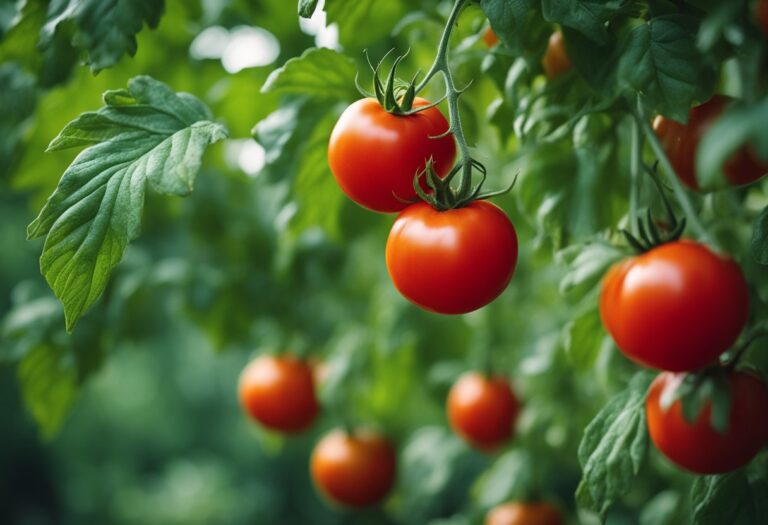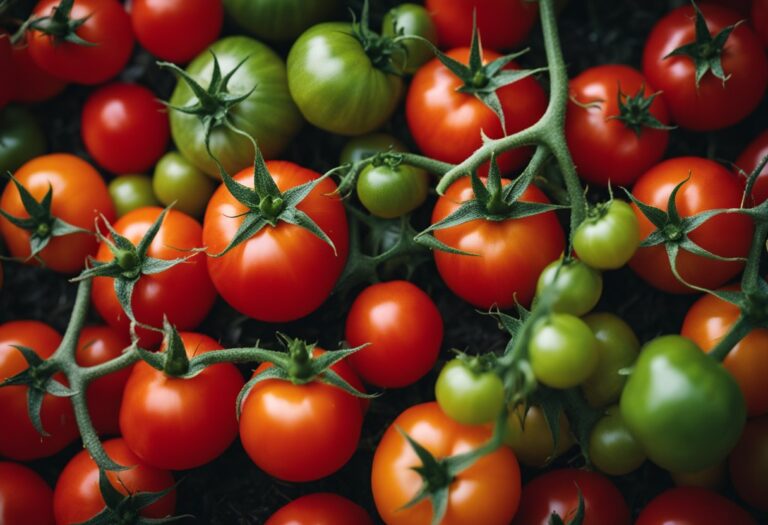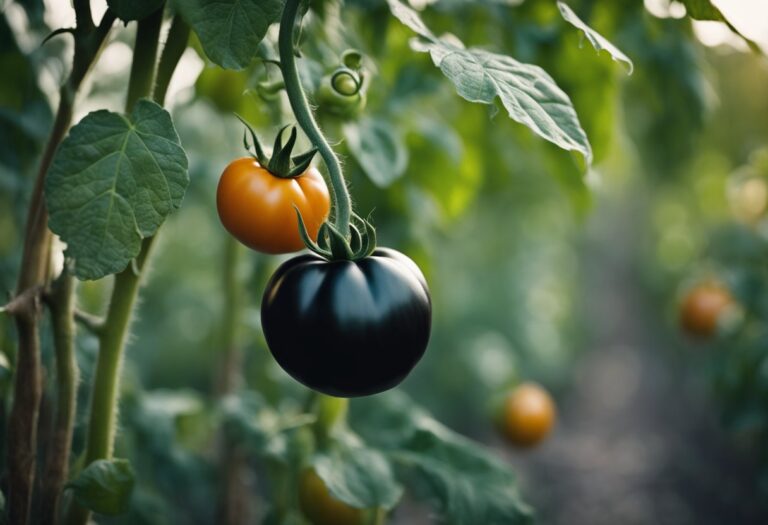The Hidden Risk in Your Garden: Unveiling the Heirloom Tomato Ban
Heirloom tomatoes are a popular variety of tomato, known for their unique flavor and appearance. However, there are some restrictions and regulations surrounding the growth and sale of heirloom tomatoes. Many people wonder why these restrictions exist and whether or not they are justified.

The answer to this question is not straightforward, as the legality of heirloom tomatoes can vary depending on the location and specific regulations in place. However, there are a few key reasons why heirloom tomatoes may be subject to restrictions or even outright bans in certain areas.
Understanding the Legality of Heirloom Tomatoes

Historical Context
Heirloom tomatoes have been around for centuries and were the only type of tomato available until the 1940s. However, with the advent of industrial agriculture, hybrid tomatoes became more popular due to their uniformity and longer shelf life.
This led to the decline of heirloom tomatoes, and they were almost extinct by the 1970s. Fortunately, a few dedicated farmers and gardeners preserved the seeds of heirloom tomatoes, and they have made a comeback in recent years.
Current Legal Framework
Heirloom tomatoes are not illegal to grow or sell in the United States. However, some states have regulations that restrict or ban the cultivation of certain varieties of tomatoes due to concerns about pests or diseases.
For example, in California, the cultivation of certain types of tomatoes is prohibited to prevent the spread of the tomato yellow leaf curl virus. In Florida, the cultivation of certain types of tomatoes is restricted to prevent the spread of the tomato spotted wilt virus.
In addition, some local governments have zoning laws that prohibit the cultivation of vegetables in residential areas. This includes the cultivation of heirloom tomatoes. However, many cities and towns have amended their zoning laws to allow the cultivation of vegetables in residential areas, including heirloom tomatoes.
Overall, while there are some restrictions on the cultivation of heirloom tomatoes, they are generally legal to grow and sell in the United States.
Reasons Behind the Restrictions

Heirloom tomatoes are not illegal, but there are restrictions on their production and sale. Here are some reasons behind the restrictions.
Agricultural Concerns
One reason for the restrictions on heirloom tomatoes is related to agriculture. Heirloom tomatoes are not as resistant to pests and diseases as hybrid tomatoes. This makes them more challenging to grow and maintain.
Additionally, heirloom tomatoes are not as uniform in size, shape, and color as hybrid tomatoes. This makes it difficult for farmers to produce a consistent crop, which can be a problem for commercial distribution.
Trade and Commerce Considerations
Another reason for the restrictions on heirloom tomatoes is related to trade and commerce. Hybrid tomatoes are preferred by large-scale supermarkets because they have a longer shelf life than heirloom tomatoes.
They are also more uniform in size, shape, and color, which makes them more visually appealing to consumers. This preference for hybrid tomatoes puts pressure on farmers to produce these types of tomatoes instead of heirloom tomatoes.
Impact on Farmers and Gardeners
Economic Implications
Heirloom tomatoes have a significant impact on farmers and gardeners. These tomatoes are often grown for their unique taste, texture, and appearance, which makes them a popular choice among consumers. However, due to their delicate nature, they require more attention and care than hybrid tomatoes. As a result, they are often more expensive to produce, which can make them less profitable for farmers.
In addition, some cities and states have laws that restrict the sale of heirloom tomatoes. For example, in some areas, farmers must have a special license to sell heirloom tomatoes at farmers’ markets. This can be a significant barrier for small-scale farmers who may not have the resources to obtain the necessary permits.
Cultural Significance
Heirloom tomatoes have a rich cultural significance and are often passed down through generations of families. They are a symbol of tradition and heritage, and many people value them for their historical and cultural importance. However, the restrictions on heirloom tomatoes can limit access to these varieties, which can have a negative impact on cultural preservation.
Furthermore, heirloom tomatoes are often grown using traditional farming methods, which can have a positive impact on the environment. These methods are typically less harmful to the soil and require fewer pesticides and herbicides. By limiting access to heirloom tomatoes, there is a risk of losing these traditional farming practices, which can have negative environmental consequences.
Overall, the restrictions on heirloom tomatoes can have significant economic and cultural implications for farmers and gardeners. It is important to consider these factors when making decisions about the production and sale of these unique varieties.
Navigating the Legal Landscape
Compliance and Advocacy
Heirloom tomatoes are not illegal everywhere, but they are banned in some places due to regulations that require produce to meet certain standards for uniformity and shelf life. Farmers and gardeners who want to grow heirloom tomatoes need to navigate the legal landscape to ensure compliance with local laws.
This may involve obtaining permits, adhering to zoning regulations, and complying with food safety laws. Compliance can be a challenge, but advocacy groups are working to change the laws and regulations that restrict the cultivation and sale of heirloom tomatoes.
Alternative Solutions
For those who are unable to grow heirloom tomatoes due to legal restrictions, there are alternative solutions. One option is to purchase them from farmers markets or specialty stores that are exempt from the regulations.
Another option is to grow them indoors or in a greenhouse, which is not subject to the same regulations as outdoor cultivation. Additionally, some gardeners have found success in growing hybrid varieties that have similar flavor profiles to heirloom tomatoes but are more resistant to disease and pests.
Frequently Asked Questions
What regulations affect the sale of heirloom tomatoes in the US?
Heirloom tomatoes are not illegal to grow or sell in the US. However, they may be restricted or banned in certain places due to local regulations and standards. For example, some states have laws prohibiting the sale of certain varieties of tomatoes, including heirloom tomatoes, that do not meet specific size, shape, or color requirements. It is important to check with local authorities before selling or growing heirloom tomatoes.
How do European laws impact the availability of heirloom tomatoes?
In Europe, heirloom tomatoes are subject to strict regulations that govern their production, labeling, and sale. For example, the European Union has established a list of approved tomato varieties that can be sold as “traditional” or “heirloom” tomatoes. These regulations are designed to protect consumers from misleading labeling and ensure the quality and authenticity of heirloom tomatoes.
What are the reasons behind the high cost of heirloom tomatoes?
Heirloom tomatoes are often more expensive than regular tomatoes because they require more labor-intensive cultivation methods and have a shorter shelf life. Additionally, because heirloom tomatoes are not as widely available as regular tomatoes, they are often sold at a premium price. However, many people are willing to pay the extra cost for the unique flavor and texture of heirloom tomatoes.
What makes heirloom tomatoes different from regular tomatoes?
Heirloom tomatoes are different from regular tomatoes in several ways. First, they are open-pollinated, which means they are pollinated naturally by insects or wind rather than through human intervention. Second, heirloom tomatoes are often older varieties that have been passed down through generations of farmers and gardeners. Finally, heirloom tomatoes come in a wide variety of shapes, sizes, and colors, and have a unique flavor and texture that sets them apart from regular tomatoes.
Where can one purchase heirloom tomatoes?
Heirloom tomatoes can be purchased at farmers’ markets, specialty grocery stores, and online retailers. Many local farmers and gardeners also sell heirloom tomatoes at roadside stands or through community-supported agriculture (CSA) programs. It is important to choose a reputable source to ensure the quality and authenticity of the heirloom tomatoes.
Are there any safety concerns associated with consuming heirloom tomatoes?
No, there are no safety concerns associated with consuming heirloom tomatoes. Heirloom tomatoes are safe to eat and are subject to the same food safety regulations as regular tomatoes. However, it is important to wash all fruits and vegetables thoroughly before eating to remove any dirt or bacteria that may be present on the surface.



